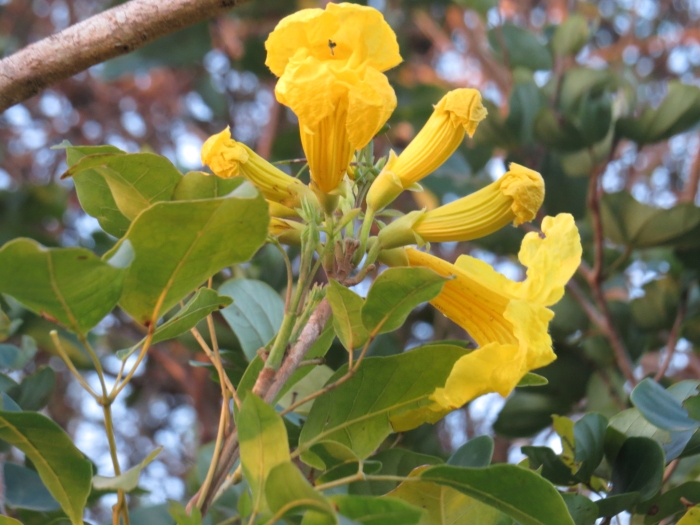Yellow Lapacho
(Tabebuia serratifolia)
Yellow Lapacho (Tabebuia serratifolia)
/
/

© Diogo Luiz
CC BY-SA 4.0
Image By:
© Diogo Luiz
Recorded By:
Copyright:
CC BY-SA 4.0
Copyright Notice:
Photo by: © Diogo Luiz | License Type: CC BY-SA 4.0 | License URL: http://creativecommons.org/licenses/by-sa/4.0/ | Uploader: diogoluiz | Publisher: iNaturalist |

















Estimated Native Range
Summary
Tabebuia serratifolia, commonly known as Yellow Lapacho, Pau d’Arco, or Yellow Ipe, is a deciduous tree native to a variety of habitats including the cerrado, a tropical savanna, as well as dry forests and the Amazon rainforest in Central and South America. Its range extends from Brazil to French Guiana, Bolivia, Paraguay, and Northern Argentina. One of the largest and strongest trees in tropical forests, it can reach up to 150 feet tall with a base diameter of 4-7 feet. The Yellow Lapacho is notable for its impressive canopy and vibrant yellow flowers that bloom in clusters, creating a spectacular display before the new leaves emerge. The flowering season is typically brief but intense, occurring at the end of the dry season.
This species is valued for its durable, rot-resistant wood and its ornamental qualities, making it popular for urban planting, as a specimen tree, and in reforestation projects. It thrives in full sun and requires well-drained soil. While it is drought-tolerant once established, it benefits from regular watering during prolonged dry periods. Gardeners should be aware that Tabebuia serratifolia has a deep root system that can interfere with built structures. It is potentially invasive outside its native range, so it is crucial to consult local regulations before planting.CC BY-SA 4.0
This species is valued for its durable, rot-resistant wood and its ornamental qualities, making it popular for urban planting, as a specimen tree, and in reforestation projects. It thrives in full sun and requires well-drained soil. While it is drought-tolerant once established, it benefits from regular watering during prolonged dry periods. Gardeners should be aware that Tabebuia serratifolia has a deep root system that can interfere with built structures. It is potentially invasive outside its native range, so it is crucial to consult local regulations before planting.CC BY-SA 4.0
Plant Description
- Plant Type: Tree
- Height: 20-50 feet
- Width: 20-30 feet
- Growth Rate: Moderate
- Flower Color: Yellow
- Flowering Season: Spring
- Leaf Retention: Evergreen
Growth Requirements
- Sun: Full Sun
- Water: Medium
- Drainage: Fast
Common Uses
Bee Garden, Bird Garden, Butterfly Garden, Low Maintenance, Showy Flowers, Street Planting
Natural Habitat
Native to cerrado, dry forests, and the Amazon rainforest
Other Names
Common Names: Yellow Ipe, Trumpet Tree
Scientific Names: , Tabebuia serratifolia,
GBIF Accepted Name: